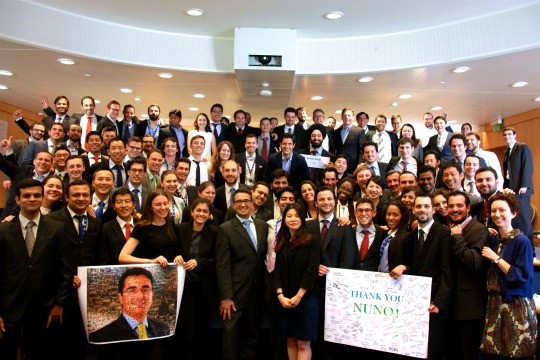Forum Home > GMAT > Quantitative > Problem Solving (PS)
|
|

GMAT Club Daily Prep
Thank you for using the timer - this advanced tool can estimate your performance and suggest more practice questions. We have subscribed you to Daily Prep Questions via email.
Customized
for You
Track
Your Progress
Practice
Pays
Not interested in getting valuable practice questions and articles delivered to your email? No problem, unsubscribe here.
stevenfuqua
Joined: 24 Nov 2013
Last visit: 07 Oct 2016
Posts: 95
Own Kudos:
Given Kudos: 9
Concentration: Healthcare
Schools: Duke '15 (M)
Kudos
Bookmarks
| FROM From Bench to Board (Fuqua): Career Development 101: Love the Industry you're in and Be an Expert |
|
There is without a doubt a stereotype for recent MBA grads – folks who are ambitious, smart, hard-working, but oftentimes lack experience or domain knowledge. Looking around and at myself, I think this is somewhat true, but there are steps to take to quickly be treated as a peer among veterans in the industry of your post-MBA career. Here’s what you gotta do. This is the 5th and final post in my series, Career Development 101, tailored specifically for professionals with MBAs, doing their MBA, or thinking of doing an MBA. Continue reading » |
This Blog post was imported into the forum automatically. We hope you found it helpful. Please use the Kudos button if you did, or please PM/DM me if you found it disruptive and I will take care of it.
-BB
NewCardinal
Joined: 28 Dec 2012
Last visit: 30 Aug 2016
Posts: 20
Own Kudos:
Given Kudos: 1
Concentration: Entrepreneurship, General Management
Schools: Sloan Fellows (M) Darden GEMBA (A)
GMAT 1: 700 Q48 V38
GPA: 3.1
WE:Management Consulting (Internet and New Media)
Kudos
Bookmarks
| FROM SLOAN LIFE - Sharing my journey through Stanford GSB: Blogging and analytics tools |
|
I’m surprised no one has asked this until now – but I’ve had a couple people ask about the mechanics of blogging. 1: It’s a bigger time commitment that you could possibly imagine (ok, it’s really not that much time in aggregate, but forcing yourself to do it is harder than it sounds). 2: Free tools usually suck: If you’re going to blog, expect to pay for things that make your life easier, make your blog prettier, etc. But, you don’t always have to pay a lot! 3: Writing is easier than cat-herding: Even though I just told you how hard it is to commit to your own blog, you have no idea how difficult things can get until you try coordinating multiple creatives… Unless you write their paychecks, your volunteer blog contributors will inevitably have writer’s block, lack of inspiration or competing priorities that prevent them from writing to a set schedule. For those of you out there like me – straight out of grad school, two startups, one Kickstarter campaign and a blog – analytics are crucial to learn where to spend your time. But, if you’re in the same boat as me, you also know that Cash is King (see, I was listening Prof. Ilya)! Occasionally, you run into great tools that are not expensive! Sure, Google Analytics are available too (and free), but have you ever tried to use it? It isn’t very user friendly and I can’t figure out if the functionality is limited or maybe I just don’t know how to use their tools… Hosted WordPress This website, DecadentMinimalist.com and blog.hinted.com are all run on different flavors of hosted WordPress… Why different flavors? WordPress.com takes the open-source wordpress.org blogging platform and turns it into an easy-to-use and nearly bullet-proof hosted platform – that ease of use and security also come with some restrictions. You can’t install most WordPress plugins and many of the nice looking templates are fee-based add-ons. So what starts cheap can get quite pricey… WordPress hosted at external vendors (like GoDaddy or any number of other hosting companies) have the advantage of using unaltered wordpress.org tools – so the full suite of plug-ins and 3rd party tools are at your disposal. But now you are partially responsible for keeping your stuff up-to-date and running smoothly. You need to decide which is more important… S3Stat – tastes great & less filling! But, if you host any static content on Amazon S3, there is a great, easy to use tool that gives you detailed analytics – easy to use, easy to decipher and a pretty dashboard to boot. No software installation required either – just tell S3Stat where to find your S3 logs and it starts digesting that data into useful views. Easy as pie. By hosting pictures, documents, media – any static downloadables – on S3, you can easily get around space limitations that you face on hosted blogging platforms – and at the same time, get much better logging visibility by using S3Stat! Hope this helps! -E |
This Blog post was imported into the forum automatically. We hope you found it helpful. Please use the Kudos button if you did, or please PM/DM me if you found it disruptive and I will take care of it.
-BB
stevenfuqua
Joined: 24 Nov 2013
Last visit: 07 Oct 2016
Posts: 95
Own Kudos:
Given Kudos: 9
Concentration: Healthcare
Schools: Duke '15 (M)
Kudos
Bookmarks
| FROM From Bench to Board (Fuqua): Is an MBA Worth It? 1-Year Post-MBA Reflection |
|
In early 2012, when I was working as a biomedical researcher at the National Institutes of Health, I decided that I wanted to get an MBA and make the transition into the business side of health care. That was almost 5 years ago. Now as I pass my 1-year mark after getting my MBA from Duke, I decided that it is a good time to do some reflecting and see what the MBA has done for me so far. Continue reading » |
This Blog post was imported into the forum automatically. We hope you found it helpful. Please use the Kudos button if you did, or please PM/DM me if you found it disruptive and I will take care of it.
-BB











